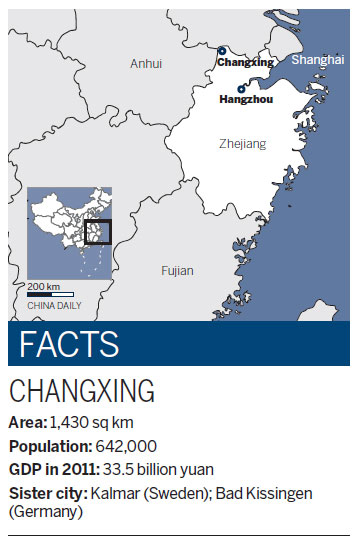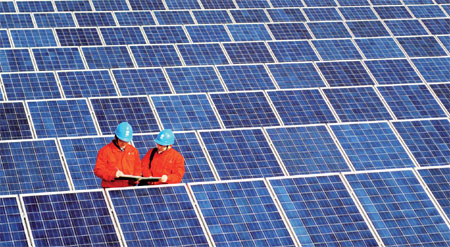Charging green
Updated: 2012-03-02 08:50
By Yan Yiqi and Zhang Jianming (China Daily)
|
||||||||
|
Government officials in Changxing examine solar panels newly installed by a local company. The county is making efforts to upgrade its battery industry as a new-energy destination. [Liang Zhen / for China Daily] |
Lead acid battery industry in Changxing shows the world that it can clean up its act
It is not an easy task to triumph against the odds. But perseverance and grit can sometimes bring out the best in people or industry, and so has been the case with Changxing, a city in East China's Zhejiang province. Not too many would have imagined that Changxing would have been able to shed its tainted image and champion the cause of green energy in China. Certainly not an easy task considering that the city's pillar industry, battery manufacturing, was in the limelight for all the wrong reasons a few years ago for environmental damage and excessive lead pollution.
Any story on Changxing is incomplete if it does not include the lead-acid battery industry. Particularly so as 45 percent of the lead-acid batteries made in China and 75 percent of the companies from the sector are based there.
Though the industry had faced environmental damage charges before, things worsened last year when 103 children in Zhejiang, living close to small battery plants, were found to be suffering from lead poisoning. The events that unfolded later saw a national crackdown on many unqualified battery factories across the country.
 |
More than the crackdown, it was the events that transpired in the battery industry afterwards that have now grabbed the limelight.
"Over the next five to 10 years, Changxing will become the main center for new energy and lead-acid batteries," says Wang Qingzhong, county spokesman and former deputy head of industrial development.
Official statistics show that from 2004 to 2009, environmental pollution costs in China have risen from 511.8 billion yuan ($81 billion, 60 billion euros) every year to 970.1 billion yuan every year. The economic cost of the environmental degradation in 2009 was around 1.39 trillion yuan, accounting for 3.8 percent of that year's GDP.
All of these had raised the oft-repeated questions of the direction in which China's economic growth needed to be directed. Indication of the future course was evident when in November President Hu Jintao said that China would invest 3.1 trillion yuan in green industries between 2011 and 2015.
On Feb 27, the World Bank and the Development Research Center of China's State Council released a joint research report China 2030: Building a Modern, Harmonious, and Creative High-Income Society, outlining six strategic directions for China's future. One of the six directions in that plan is "going 'green' to transform environmental stresses into green growth and as a driver for development".
When all of these are narrowed down to specific plans, it is obvious that doing away with highly polluting industries is the need of the hour. For Changxing, the choice was obvious, to either close down its lead-acid pillar industry or opt for a green-growth oriented transformation.
Of the 14 heavy metal pollution incidents involving some 4,039 people that took place in China in 2010, nine of them were lead-related, according to statistics from the Ministry of Environmental Protection. So it was obvious that the industry needed to change its act fast for survival.
Circa 2012 and Changxing no longer resembles its old self. The air in the small county with its Singapore-styled city gardens is no longer hazy. Clear blue skies and fresh air make Changxing an oasis of peace amid the hustle and bustle of big cities in China. Visitors can hardly imagine that seven years ago, the city was the center of violent protests by residents against environmental pollution.
"It seemed that the whole society was looking at us differently, and there was a general feeling that we should shut down all the battery factories in Changxing. But when we considered the impact of such a move on the local economy, we decided to tackle the problem head-on," says Wang.

 Relief reaches isolated village
Relief reaches isolated village
 Rainfall poses new threats to quake-hit region
Rainfall poses new threats to quake-hit region
 Funerals begin for Boston bombing victims
Funerals begin for Boston bombing victims
 Quake takeaway from China's Air Force
Quake takeaway from China's Air Force
 Obama celebrates young inventors at science fair
Obama celebrates young inventors at science fair
 Earth Day marked around the world
Earth Day marked around the world
 Volunteer team helping students find sense of normalcy
Volunteer team helping students find sense of normalcy
 Ethnic groups quick to join rescue efforts
Ethnic groups quick to join rescue efforts
Most Viewed
Editor's Picks

|

|

|

|

|

|
Today's Top News
Chinese fleet drives out Japan's boats from Diaoyu
Health new priority for quake zone
Inspired by Guan, more Chinese pick up golf
Russia criticizes US reports on human rights
China, ROK criticize visits to shrine
Sino-US shared interests emphasized
China 'aims to share its dream with world'
Chinese president appoints 5 new ambassadors
US Weekly

|

|








